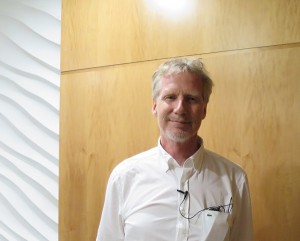“Adequate medical work in disaster and conflict areas where there is lack of infrastructures can make a real difference in terms of survival of casualties”, said Dr. Harald Veen in an interview to “Doctors Only”.
A seminar on “Surgical Management in Austere Environments”, held last week in Ashdod, was organized jointly by the International Committee of the Red Cross (ICRC), the Ministry of Health and Magen David Adom (MDA).
Translation of the article on Doctors Only, published on 10 April, 2016:
Collaboration: The Red Cross will hold a seminar for doctors in hospitals and MDA on surgeries under emergency conditions
The International Committee of The Red Cross (ICRC) Chief Surgeon Dr. Harald Veen, who answered the questions of “Doctors Only” before arriving to Israel, will attend, among others, the seminar held today and tomorrow in Ashdod
The Ministry of Health and MDA, as part of ongoing preparations for emergency Situations, have requested the ICRC for guidance on “surgeries with limited resources”, based on the experience of the organization providing medical assistance around the world.
Following the request, the ICRC will hold a seminar today (Sunday) and tomorrow in Ashdod and will address the question of how to provide medical treatment and perform surgeries in the field when the infrastructures were destroyed and there is no electricity or running water.
Dr. Harald Veen, ICRC Chief Surgeon, Vascular Surgeon, Dr. John Wolfe and Larry Maybee, the head of legal department of the ICRC in Israel will lead the seminar.
During the seminar the doctors and delegates will also discuss the ethical issues of the treatment of the wounded in emergency and distress situations.
In addition, also will participate in the seminar, Dr. Elhanan Bar-On, a specialist in orthopedic medicine and director of children orthopedic at the center of Pediatrics, “Schneider” in Petah Tikva, Dr. Ofer Merin, deputy director general for health issues and head of trauma unit and cardiologist at the medical center “Shaare Zedek” in Jerusalem; Tomer Kaplan, member of a unique disasters team as part of MDA and IDF medical officers.
The organizers stated that 35 doctors, intern surgeons from the Ministry of Health, MDA paramedics and military doctors will attended in the professional seminar.
Dr. Veen, 56, born in Holland is the Chief Surgeon of the ICRC since 2012. In this role he is responsible for all the surgical programs of the organization. He was trained as a general surgeon and specialist in vascular oncology and trauma. He has been a doctor in the Netherlands, the United Kingdom, as a doctor for the Royal British Navy in Gibraltar and was sent by the ICRC to 30 medical missions in war zones around the world.
In January 2009, he gave an interview to London’s “The Daily Telegraph” in which he described his difficult experience that he witnessed as a surgeon-doctor at the hospital, “Shifa” in Gaza during operation “Cast Lead”.
Prior his arrival to the seminar in Israel Dr. Veen corresponded electronically to a series of questions from “DoctorsOnly”. He said, “The seminar enables the ICRC to share with doctors in Israel the great knowledge they gained with the challenges of working in problematic areas. Special emphasis will be given to the issues of treatment in the field. In other words, prior the arrival of wounded to the hospital, orthopedic treatments and emergency vascular surgery and physical rehabilitation, nursing and psychosocial support further in the treatment”.
Adequate medical work in disaster and conflict areas where there is lack of infrastructure”, he added, “can make a real difference in terms of survival of casualties. Physicians and teams arriving to the field have no CT and MRI devices.
The work in environment without adequate conditions and in fragile situations challenges the physicians and medical teams. Often the health system infrastructure is limited there. No available skilled team in the field and there is no regular supply of electricity and water.
Therefore, the ability to use medical equipment that based on advanced technology and can be found in any hospital, or to receive the medication and the most innovative materials that the doctor need is simply impossible. Nevertheless, even in these difficult conditions it is possible to ensure the safety of the patient, to perform appropriate surgical interventions. To provide quality care and perform safe surgery. All these need to be performed under harsh conditions as well. There is no doubt that in all these circumstances, highly skilled professionals in the health sector should be aware that they can also cause harm, even when they try to do their best.”
“The ICRC have the expertise and the experience of medical work in fragile environments and in conflict zones around the world. This experience has allowed to develop minimum standards for the treatment of a wounded by gunshot and trauma surgery, “he said.
Quality care and safe surgeries in the field are essential, but there is also a need to consider the integration of nursing care prior and after the surgery. Physical rehabilitation of injured and sick who need physiotherapy and the supply of prostheses to people with disabilities also have an important role in providing medical aid. The assistance and the emotional support provided to the victim or patient are vital, because any effort aiming to ensure healthy and safe return of the victims to their community.
Read more:


